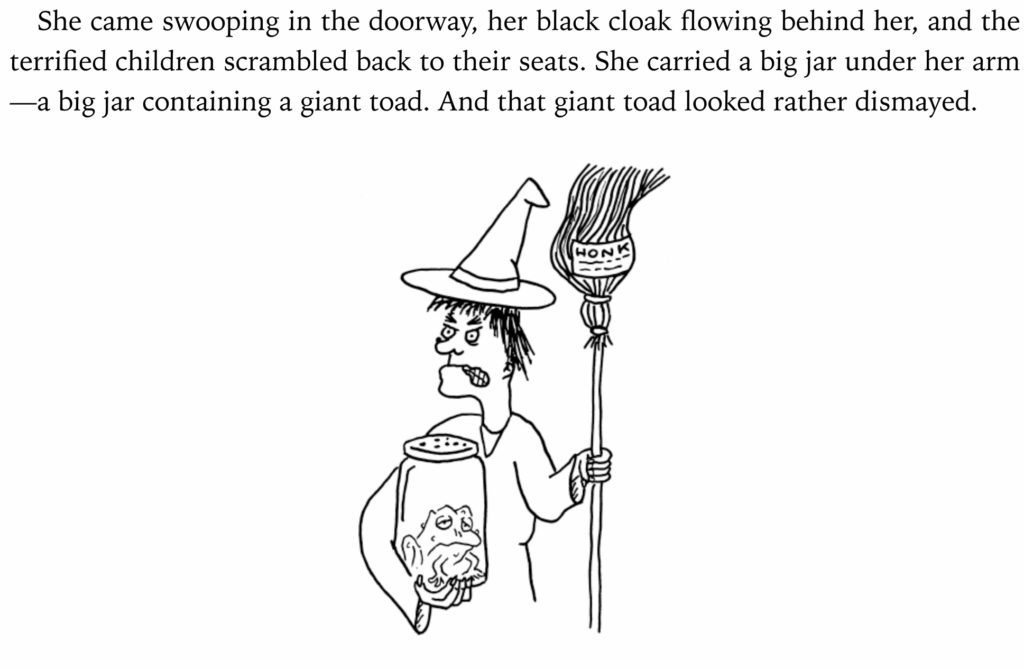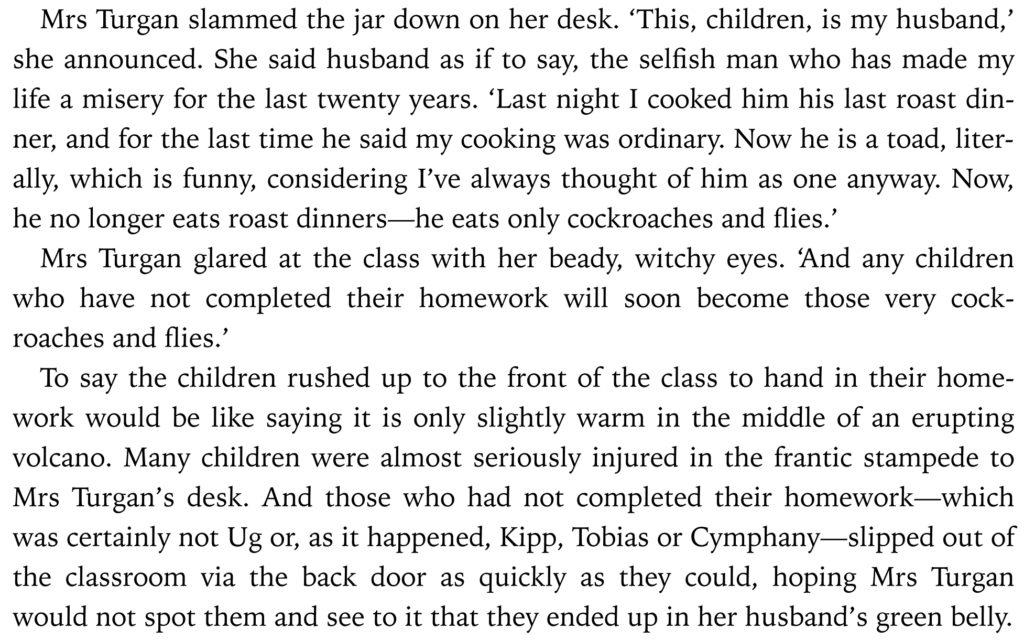
Welcome to my Children’s University Activity Page
This is an activity for keen writers, who might already be writing great stories, but are looking for some editing tips to make their stories even better. In this activity you will learn a great editing tip that I use, and it’s probably one that many of your favourite authors also use, to make my stories really zing! I call it …
The Adverb Hunt
Through this activity you’ll learn how to hunt down adverbs, and “weak” verbs, in your work, so you can think about replacing them with stronger verbs instead.
But before we even start, the first question you might ask is: what is an adverb?
An adverb is a word that modifies a verb (and a verb is a doing word, like jumped or walked, or grabbed). The quickest way you can usually spot an adverb is because it has the letters “ly” on the end of it, and it is usually written near a “weak” verb, to try and make that verb do more.
It might be easier to explain with an example. Let’s use the following sentence:
He walked quietly across the room and picked up the vase quickly.
This sentence uses two adverbs, which I’ve underlined: quietly and quickly. These adverbs are written to try and modify the weak verbs “walked” and “picked up” to make them do more. The reason we need to make these verbs do more is because they are a bit basic and common by themselves, which is why I call them “weak” verbs.
You might be asking, but if adverbs make weak verbs do more, then why are adverbs bad? Well, they’re not always bad. But sometimes instead of trying to make your weak verb do more, you should instead choose a verb that does more already – in other words, a stronger verb. For example, is “hit strongly” as good as “smashed”? Or is “laughed loudly” as good as “roared”? Often, if you get rid of your adverbs and your weak verbs, and replace them with stronger verbs, it can make your writing and your stories ten times better.
So if we apply this rule to our example sentence above – He walked quietly across the room and picked up the vase quickly – we could get rid of the adverbs and weak verbs and use stronger verbs like “snuck” and “scooped” instead. Let’s substitute those verbs in, and now the sentence reads:
He snuck across the room and scooped up the vase.
Isn’t this sentence a lot better? I hope you agree that the use of the strong verbs, instead of the weak verbs and adverbs, really helps the sentence pop!
So do you think you’ve got the idea? Good. Now it’s time for the exercise.
Read the text below, which is an early draft of a scene from my book The Extremely Weird Thing that Happened in Huggabie Falls. It’s a scene where the story’s three heroes, Kipp, Tobias and Cymphany (sitting with their classmate, Ug) are not happy when their teacher, Mrs Turgan, who is also a witch, arrives at class.
In the early draft of this scene, I used some weak verbs and adverbs, which I later hunted down and replaced with strong verbs before the story was published. Have a read of the scene and see if you can hunt down all the adverbs.
*****
She walked fiercely in the doorway, her black cloak flowing behind her, and the terrified children ran quickly back to their seats.
She carried a big jar under her arm—a big jar containing a giant toad. And that giant toad looked rather dismayed.
Mrs Turgan placed the jar roughly down on her desk. ‘This, children, is my husband,’ she announced. She said husband as if to say, the selfish man who has made my life a misery for the last twenty years. ‘Last night I cooked him his last roast dinner, and for the last time he said my cooking was ordinary. Now he is a toad, literally, which is funny, considering I’ve always thought of him as one anyway. Now, he no longer eats roast dinners—he eats only cockroaches and flies.’
Mrs Turgan looked angrily at the class with her beady, witchy eyes. ‘And any children who have not completed their homework will soon become those very cockroaches and flies.’
To say the children walked quickly up to the front of the class to hand in their homework would be like saying it is only slightly warm in the middle of an erupting volcano. Many children were almost seriously injured in the frantic stampede to Mrs Turgan’s desk. And those who had not completed their homework—which was certainly not Ug or, as it happened, Kipp, Tobias or Cymphany—slipped out of the classroom via the back door as quickly as they could, hoping Mrs Turgan would not spot them and see to it that they ended up in her husband’s green belly.
*****
Okay, if you didn’t find them all the first time, have a second read through of the scene, carefully, and see if you can find all the adverbs. Hint: there are five of them. Make sure you write them down as you find them.
How did you go? I’ll tell you what three of the adverbs are now, and I’ll tell you the other two soon. Three of the five adverbs were:
- Fiercely;
- Quickly; and
- Roughly.
Now, take a look at this scene again below, but this time it is how the scene appeared in the the final published pages from The Extremely Weird Thing That Happened in Huggabie Falls – including a wonderful illustration from Huggabie Falls illustrator Andrew Weldon. In this final text, you will see that I’ve replaced those three adverbs, and weak verbs, with stronger verbs. And you may also noticed the other two adverbs, and weak verbs, that may have been changed for a stronger verb.
*****


*****
Now that you’ve read the final text, go back and compare it to the earlier draft, and you should now be able to identify all the five adverbs, and the weak verbs they are helping, if you hadn’t already.
The five adverbs and weak verbs I replaced with stronger verbs, were as follows:
- Walked fiercely = Came swooping in;
- Ran quickly = Scrambled;
- Placed the jar roughly down = Slammed the jar down;
- Looked angrily = Glared; and
- Slipped quickly = ???.
Okay, I have to admit, I was a bit sneaky when I said I replaced five adverbs. You might have noticed I didn’t replace the final adverb and verb with a stronger verb. That’s because I already liked the verb slipped, I didn’t think it was too weak, and you don’t always have to eliminate every adverb. Some adverbs are worth keeping. It’s up to you. Remember, you’re the writer of your stories, and ultimately you have to do what feels right for you, and what works for your story. But in a lot of cases, it’s better to have as few weak verbs and adverbs as possible, and as many strong verbs as possible.
To complete this exercise, try writing down two more strong verbs, which could be further alternatives for the each of the five weak verbs and adverbs – maybe you can come up with some stronger verbs than the ones I used. Show your work to your school coordinator to receive a stamp for 30 minutes in your Passport.
To gain an extra 30 minutes come up with at least three strong verb alternatives for the following adverb and weak verb combos:
- Fell sharply;
- Jumped quickly;
- Turned wildly;
- Said angrily;
- Moved easily; and
- Held tightly.
It might seem a bit tricky and take some time at first, but the more you practice adverb hunting in your writing like this, the easier it will get. Just remember the expression, stronger verbs equals stronger words. Happy writing, and happy adverb hunting!
